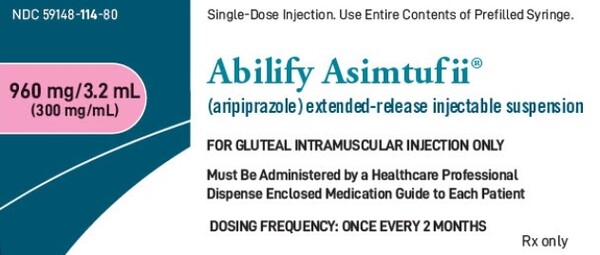A long-acting version of aripiprazole injection with improved dosing frequency for treating schizophrenia and bipolar disorder has been introduced in Korea.
The Ministry of Food and Drug Safety approved Korea Otsuka Pharmaceutical's Abilify Asimtufii (aripiprazole monohydrate) Injection 720 mg and 960 mg on Wednesday.

Abilify Asimtufii is an improvement over the existing Abilify Maintena, allowing for injection administration once every two months by lengthening dosing intervals the latter.
Schizophrenia is a chronic mental illness that requires ongoing medication, but many patients suffer from poor adherence, which increases the risk of relapse.
Long-acting injectables (LAIs) have been developed to address this issue by maintaining blood levels of medication over a period, reducing the medication burden on patients, and reducing relapse and readmission rates.
Long-acting injectables for the treatment of schizophrenia currently available in Korea include haloperidol, a first-generation antipsychotic, and risperidone, paliperidone, and aripiprazole, which are second-generation drugs.
The recent approval of Abilify Asimtufii reflects a longer dosing interval than the existing monthly long-acting aripiprazole injection. A crossover clinical study comparing bimonthly aripiprazole 960 mg dosing to monthly aripiprazole 400 mg dosing confirmed non-inferiority.
Recent studies have reported a reduced risk of persistence and relapse of psychotic symptoms when long-acting injectables are used early in the course of the illness. Therefore, while long-acting injectables have historically been reserved for patients with chronic schizophrenia, it is now recommended that they be actively considered in the early treatment phase.
Recent technological advances have improved the depot effect of long-acting injectable medications, resulting in formulations that can be administered every three to six months. These new products are expected to be more stable in maintaining blood levels, which may be more beneficial in preventing relapse and maintaining treatment efficacy.
Related articles
- Electroconvulsive therapy improves schizophrenia symptoms by changing brain microstructure
- Government to require medical certificates for physicians to curb narcotics abuse
- Lawmaker urges license revocation for mentally ill and addicted doctors still practicing despite audit findings
- Psychiatrists warn proposed ban on physical restraints in psychiatric hospitals could jeopardize patient care, public safety
- After 5-year delay, CMC Pharmaceutical wins FDA nod for oral schizophrenia drug
- Accreditation agency issues warning over escapes of psychiatric patients

